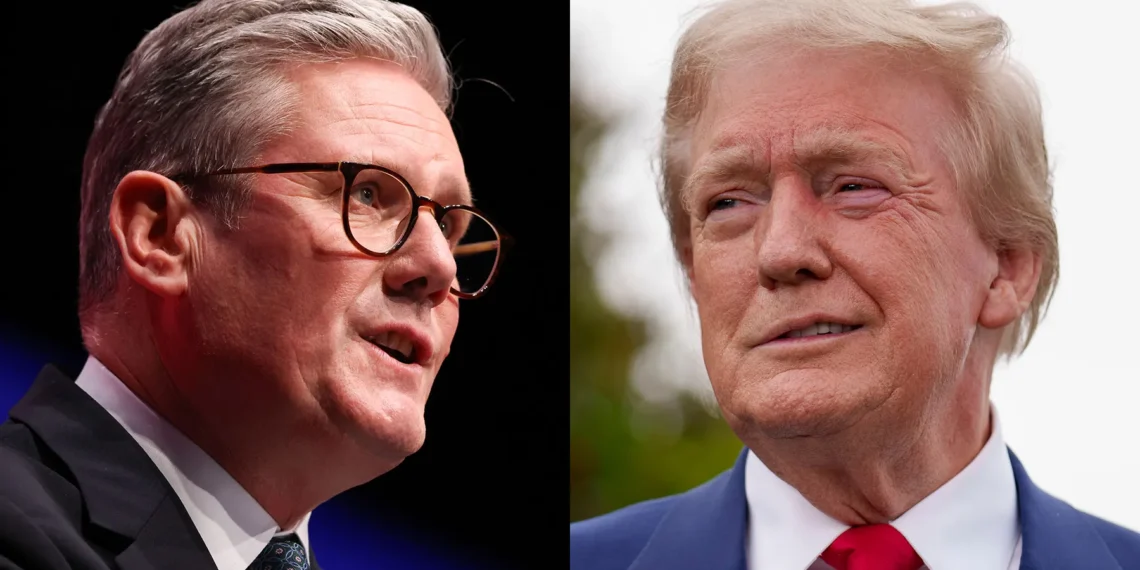U.S. President Donald Trump has sparked fresh speculation after revealing plans for a press conference on what he called a “major trade deal with representatives of a big, and highly respected, country.”
The announcement, made via his Truth Social platform, has triggered widespread anticipation as the UK scrambles to finalize an agreement that could counteract the economic strain from recent tariffs imposed by Washington.
Just weeks ago, Mr. Trump introduced sweeping trade levies targeting Britain, slapping a 10 per cent duty on all UK exports and imposing a heavy 25 per cent tariff on key sectors including steel, aluminium, and automobiles. The move sent shockwaves through global markets and dealt a severe blow to British public finances, prompting swift diplomatic efforts from London to soften the impact.
UK officials have since been in talks with the U.S. to hash out a trade pact that could provide breathing room for British industries. Among the options reportedly discussed is a possible reduction in British tariffs on certain American imports and revisions to the UK’s digital services tax, which disproportionately affects U.S.-based tech giants.
However, British negotiators have firmly ruled out compromising on specific domestic standards. The government has made it clear that food safety regulations will not be relaxed to permit a greater influx of American agricultural goods. Additionally, ministers have resisted calls to water down the Online Safety Act, despite criticisms from the U.S. that it restricts freedom of expression.
If confirmed, the agreement would be the first major economic accord struck since Mr. Trump’s tariffs were enacted last month. Observers say such a development would not only help ease the financial pressure facing British exporters but could also serve as a political victory for Prime Minister Keir Starmer.
Starmer has faced growing pressure after Labour suffered setbacks in recent local elections. Yet a successful trade agreement with the U.S. could reinforce his diplomatic strategy, especially given his noticeably cautious approach to publicly criticizing Trump and his administration.
UK Government Racing To Cut A Trade Deal
Chancellor Rachel Reeves stated that the government has been working “flat out” to secure a trade agreement with the United States that will blunt the impact of the new tariffs. While many await official confirmation, speculation is mounting that a U.S.-UK deal could be announced as early as Thursday.

Defence Secretary John Healey declined to confirm the timing but acknowledged the importance of U.S.-UK cooperation: “It’s certainly true that the US is an indispensable ally for the UK, both on economic and national security grounds.”
This latest U.S. development follows closely on the heels of a major deal with India, announced just days ago. That agreement will significantly reduce tariffs on British goods such as scotch whisky and vehicles, while slashing levies on aerospace components, electronics, and food products. It will also make Indian clothing and goods more affordable for UK consumers.
“We are now in a new era for trade and the economy. That means going further and faster to strengthen the UK’s economy, putting more money in working people’s pockets.”
He described the partnership as a “landmark deal with India – one of the fastest growing economies in the world, which will grow the economy and deliver for British people and business.”
Indian Prime Minister Narendra Modi echoed the sentiment, calling the trade agreement a “historic milestone” and an “ambitious and mutually beneficial” accord. He added that it would “catalyse trade, investment, growth, job creation, and innovation in both our economies.”
As the UK awaits further updates from Washington, the outcome of these high-stakes negotiations could shape the future of British trade policy under Starmer’s leadership — and redefine the nation’s economic ties with two global powerhouses.
READ ALSO: Parliament Questioned Over Alleged Security Allowance























